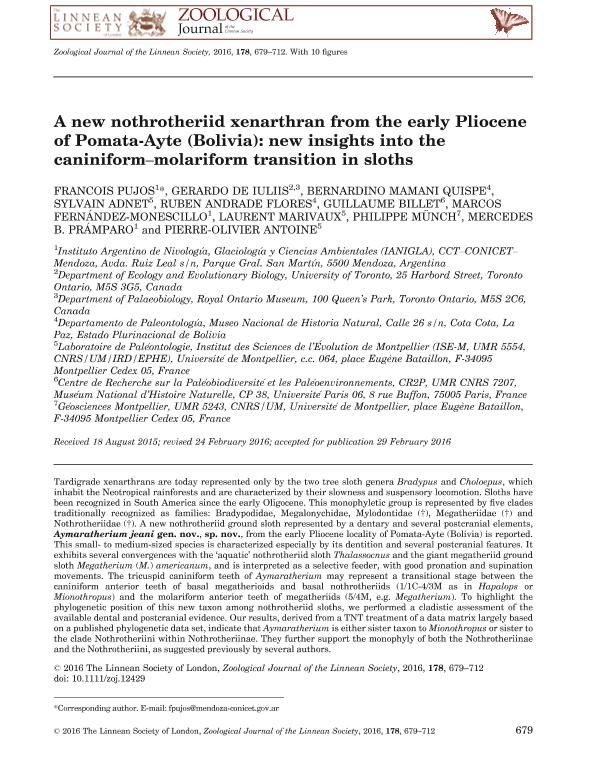Mostrar el registro sencillo del ítem
dc.contributor.author
Pujos, François Roger Francis

dc.contributor.author
De Iuliis, Gerardo
dc.contributor.author
Mamani Quispe, Bernardino
dc.contributor.author
Adnet, Sylvain
dc.contributor.author
Andrade Flores, Ruben
dc.contributor.author
Billet, Guillaume
dc.contributor.author
Fernández Monescillo, Marcos
dc.contributor.author
Marivaux, Laurent

dc.contributor.author
Münch, Philippe
dc.contributor.author
Pramparo, Mercedes Beatriz

dc.contributor.author
Antoine, Pierre Olivier

dc.date.available
2023-01-02T18:02:12Z
dc.date.issued
2016-11
dc.identifier.citation
Pujos, François Roger Francis; De Iuliis, Gerardo; Mamani Quispe, Bernardino; Adnet, Sylvain; Andrade Flores, Ruben; et al.; A new nothrotheriid xenarthran from the early Pliocene of Pomata-Ayte (Bolivia): New insights into the caniniform–molariform transition in sloths; Oxford University Press; Zoological Journal of the Linnean Society; 178; 3; 11-2016; 679-712
dc.identifier.issn
0024-4082
dc.identifier.uri
http://hdl.handle.net/11336/182949
dc.description.abstract
Tardigrade xenarthrans are today represented only by the two tree sloth genera Bradypus and Choloepus, which inhabit the Neotropical rainforests and are characterized by their slowness and suspensory locomotion. Sloths have been recognized in South America since the early Oligocene. This monophyletic group is represented by five clades traditionally recognized as families: Bradypodidae, Megalonychidae, Mylodontidae (†), Megatheriidae (†) and Nothrotheriidae (†). A new nothrotheriid ground sloth represented by a dentary and several postcranial elements, Aymaratherium jeani gen. nov., sp. nov., from the early Pliocene locality of Pomata-Ayte (Bolivia) is reported. This small- to medium-sized species is characterized especially by its dentition and several postcranial features. It exhibits several convergences with the ‘aquatic’ nothrotheriid sloth Thalassocnus and the giant megatheriid ground sloth Megatherium (M.) americanum, and is interpreted as a selective feeder, with good pronation and supination movements. The tricuspid caniniform teeth of Aymaratherium may represent a transitional stage between the caniniform anterior teeth of basal megatherioids and basal nothrotheriids (1/1C-4/3M as in Hapalops or Mionothropus) and the molariform anterior teeth of megatheriids (5/4M, e.g. Megatherium). To highlight the phylogenetic position of this new taxon among nothrotheriid sloths, we performed a cladistic assessment of the available dental and postcranial evidence. Our results, derived from a TNT treatment of a data matrix largely based on a published phylogenetic data set, indicate that Aymaratherium is either sister taxon to Mionothropus or sister to the clade Nothrotheriini within Nothrotheriinae. They further support the monophyly of both the Nothrotheriinae and the Nothrotheriini, as suggested previously by several authors.
dc.format
application/pdf
dc.language.iso
eng
dc.publisher
Oxford University Press

dc.rights
info:eu-repo/semantics/openAccess
dc.rights.uri
https://creativecommons.org/licenses/by-nc-sa/2.5/ar/
dc.subject
ANATOMY
dc.subject
BOLIVIA
dc.subject
EARLY PLIOCENE
dc.subject
NOTHROTHERIIDAE
dc.subject
PHYLOGENY
dc.subject
PILOSA
dc.subject
XENARTHRA
dc.subject.classification
Otras Ciencias Naturales y Exactas

dc.subject.classification
Otras Ciencias Naturales y Exactas

dc.subject.classification
CIENCIAS NATURALES Y EXACTAS

dc.title
A new nothrotheriid xenarthran from the early Pliocene of Pomata-Ayte (Bolivia): New insights into the caniniform–molariform transition in sloths
dc.type
info:eu-repo/semantics/article
dc.type
info:ar-repo/semantics/artículo
dc.type
info:eu-repo/semantics/publishedVersion
dc.date.updated
2022-12-27T18:15:06Z
dc.identifier.eissn
1096-3642
dc.journal.volume
178
dc.journal.number
3
dc.journal.pagination
679-712
dc.journal.pais
Reino Unido

dc.journal.ciudad
Oxford
dc.description.fil
Fil: Pujos, François Roger Francis. Consejo Nacional de Investigaciones Científicas y Técnicas. Centro Científico Tecnológico Conicet - Mendoza. Instituto Argentino de Nivología, Glaciología y Ciencias Ambientales. Provincia de Mendoza. Instituto Argentino de Nivología, Glaciología y Ciencias Ambientales. Universidad Nacional de Cuyo. Instituto Argentino de Nivología, Glaciología y Ciencias Ambientales; Argentina
dc.description.fil
Fil: De Iuliis, Gerardo. University of Toronto; Canadá. Royal Ontario Museum; Canadá
dc.description.fil
Fil: Mamani Quispe, Bernardino. Museo Nacional de Historia Natural; Bolivia
dc.description.fil
Fil: Adnet, Sylvain. Université de Montpellier; Francia
dc.description.fil
Fil: Andrade Flores, Ruben. Museo Nacional de Historia Natural; Bolivia
dc.description.fil
Fil: Billet, Guillaume. Universite de Paris VI; Francia
dc.description.fil
Fil: Fernández Monescillo, Marcos. Consejo Nacional de Investigaciones Científicas y Técnicas. Centro Científico Tecnológico Conicet - Mendoza. Instituto Argentino de Nivología, Glaciología y Ciencias Ambientales. Provincia de Mendoza. Instituto Argentino de Nivología, Glaciología y Ciencias Ambientales. Universidad Nacional de Cuyo. Instituto Argentino de Nivología, Glaciología y Ciencias Ambientales; Argentina
dc.description.fil
Fil: Marivaux, Laurent. Université de Montpellier; Francia
dc.description.fil
Fil: Münch, Philippe. Université de Montpellier; Francia
dc.description.fil
Fil: Pramparo, Mercedes Beatriz. Consejo Nacional de Investigaciones Científicas y Técnicas. Centro Científico Tecnológico Conicet - Mendoza. Instituto Argentino de Nivología, Glaciología y Ciencias Ambientales. Provincia de Mendoza. Instituto Argentino de Nivología, Glaciología y Ciencias Ambientales. Universidad Nacional de Cuyo. Instituto Argentino de Nivología, Glaciología y Ciencias Ambientales; Argentina
dc.description.fil
Fil: Antoine, Pierre Olivier. Université de Montpellier; Francia
dc.journal.title
Zoological Journal of the Linnean Society

dc.relation.alternativeid
info:eu-repo/semantics/altIdentifier/url/https://academic.oup.com/zoolinnean/article/178/3/679/2667471
dc.relation.alternativeid
info:eu-repo/semantics/altIdentifier/doi/https://doi.org/10.1111/zoj.12429
Archivos asociados
